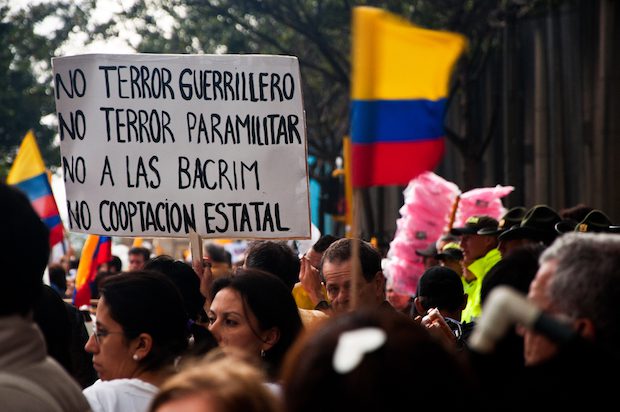A Lesson From Colombia’s Vote?

A reader writes:
I’m a Colombian living in the States who is an avid reader of your blog!
Yesterday Colombia had a plebiscite regarding the peace agreement with the Marxist guerrillas and, incredibly, the No won…
It’s is hard to explain all the reasons why this happened (even those who opposed the plebiscite “knew” it was going to be approved)…
Political leaders in some areas did not push their constituents into voting (they didn’t have anything to lose). The Caribbean coast, for example, is known for its corruption and how local leaders literally buy votes. However this time, there was not money for that…
The agreement was giving unprecedented concessions to the guerrillas: a given number of seats in the congress, and no jail time for their leaders (even those guilty of human right violations). Most of us want the peace in our country but believe that justice and jail time for those guilty of terrible crimes…
Interestingly I find an analogy with the ongoing situation with the presidential elections here in the States. Everywhere around the social media [in Colombia] you can read the outcry of those who voted yes.The ones who voted no stayed pretty much closeted until yesterday, and are now being called warriors and peace haters, bigots and so on (by the way the peace agreements had their fare share of LGBT ideology, so many conservatives also voted no for this reason).
Colombia right now is in the limbo, and maybe in five weeks America will be too…
Just like Brexit. The NYT analyzes why the No voters won this shocking upset. Excerpt:
The narrow defeat of the deal shocked Latin America, where the end of Colombia’s 52-year war with the Revolutionary Armed Forces of Colombia, or FARC, had seemed all but guaranteed.
Months of polling had predicted a wide margin of victory for the agreement, creating such a sense of confidence that the government had already held a public signing in front of world leaders before the vote took place.
Now, Colombia’s humbled leaders are asking: What happened?
Lulled by the polls, the government failed to drive Colombians to the ballot box, resulting in anemic turnout in places that favored the deal. President Juan Manuel Santos had staked his legacy on achieving peace, but his approval ratings were so low that his endorsement may have actually hurt the deal’s chances.
Then came Hurricane Matthew, which drenched the northern coasts supportive of the peace deal, leading many to stay home.
But for many others, the reason the deal failed was an emotional one. The agreement had always been a tug of war between peace and justice, and in the end, the demand for justice won.
“Sometimes, it even seemed like they knew they got off easy,” Diana Hurtado, 37, a dog walker in the capital, Bogotá, said of the rebels. “When you see photos from Havana, they are laughing.”
The Times says that No voters could not accept that there would be such a widespread amnesty for guerrillas who had terrorized so many for so long.
Now, do you think that the Colombian reader might well have a point about Trump underpolling? Me, if I were going to vote for Trump, I wouldn’t tell a soul, not even my wife, and for sure not a pollster. And, Trump voters do seem a lot more motivated than Hillary voters.
Somebody sent me via social media this set of charts from the St. Louis Federal Reserve. It’s the Obama years. Though it’s easy to see the argument for voting against Trump, it’s a lot harder to see the argument for staying the Democratic course. Maybe the Colombian reader is on to something…
UPDATE: Too many of you readers have said these charts are bogus for me to leave them up without checking them out. So I’ve taken them down.
Subscribe for as little as $5/mo to start commenting on Rod’s blog.